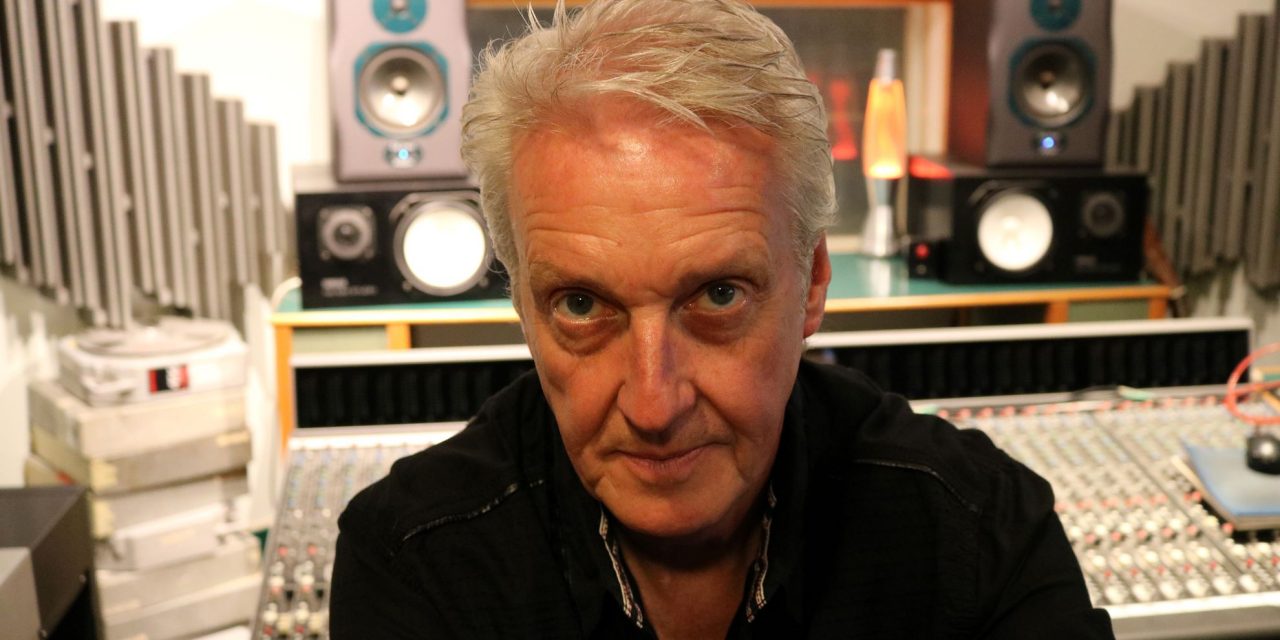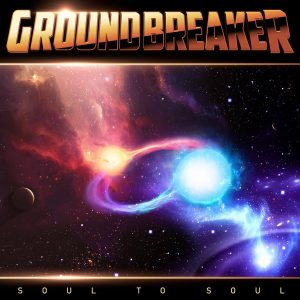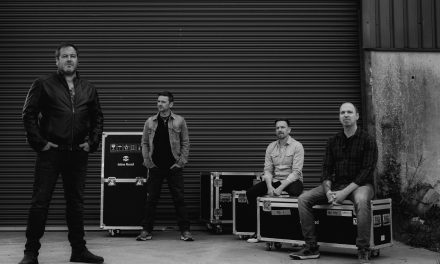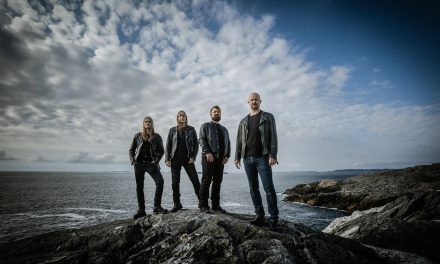
Steve Overland of FM goes Soul To Soul with Groundbreaker


Photo Credit: Scott Towns
Steve Overland of FM goes Soul To Soul with Groundbreaker
Steve Overland is best known for his tenure in the band FM, whose albums such as Tough It Out and Indiscreet are classics within the melodic rock AOR genre. Even in the midst of a worldwide pandemic, Overland found himself busier than ever with FM, his own solo work, as well as collaborations with others. One such meeting of the minds is Groundbreaker, with Steve Overland working with the omnipresent Alessandro Del Vecchio – and their latest magnum opus of sonic intrigue is entitled Soul To Soul – now available via Frontiers Music Srl. In this interview with Steve Overland, we discuss Groundbreaker and the making of Soul To Soul, iconic album anniversaries and other FM news, working with Robbie LaBlanc of Find Me on his own solo effort, and other rocking topics of interest! Read on…
What initially made you decide to commit to the Groundbreaker project now that you’re two albums in?
I am always open to new things and I knew Alessandro Del Vecchio, the producer keyboard player, and Serafino Perugino from Frontiers Records, put it to me that he’d like me to make a retro 80s all-out AOR melodic rock record. It’s not quite as bluesy as these other things I do, and I quite fancied reaching back into that part of my writing career and having a go at it. That’s how it was born. Groundbreaker was created by Serafino and Alessandro, and it’s grown from there. It’s been a pleasure doing it because they are such easy people to work with, and I’ve loved making the records.
What does that title “Soul To Soul” mean to you?
It’s one of the tunes on the record and it’s one of the songs that I didn’t have a part in writing. I co-wrote about five of the songs on this record – I co-wrote all the songs on all the first record. But I’ve been working on many other things – with the new FM record and other things that I’m doing that I didn’t really have so much time to work on this one. That’s one of Alessandro’s songs, one of his co-writes, and they sent it to me and I love the song. I think it was such a key tune on the record. That’s why the record ended up being named after that song.
What was it like recording this Groundbreaker album in the middle of a pandemic?
The funny thing is, I haven’t been able to the tour which is normally what my life is. I’m never at home. I’ve never had time to do stuff. I’ve been so busy during the pandemic. It’s been amazing. Recording different records, sessions for people, writing. It’s been a really creative time for me because it freed up time like it did for everybody. It was great making it. It’s a bit weird because obviously, you’re all in different countries, so you’re not together when you’re making the record. But with technology now, Ale sent me the backing tracks, I messed around with them, added to them around, wrote all the melodies, and the titles, and sang them. You can actually make records without you being in the room together now. It came out great and I really enjoyed doing it, and it was great to keep busy during the pandemic because it made you not dwell too much on what was going on.

He’s fantastic. I know Ale from a long time ago. He’s always been a friend of mine, he’s very easy, super talented in my opinion. Working with him is just easy. He’s one of the easiest people to work with. And once we set our minds to do it, we just talk to each other about the concept beyond what we want the record to be, and before you know it, he’s sending me tracks. I’ll write them, I’ll record them and it’s done. And it’s such an easy process because we’re friends and we get along so well, and we understand what we want Groundbreaker to be. It’s been a pleasure, to be honest, working with him on both records.
Frontiers just celebrated their 25th anniversary as a label, how did you initially become in contact with Frontiers?
Serafino Perugino and Mario de Riso at the labels are old fans of FM. When we reformed, we didn’t initially want to sign to another label having been with Epic CBS for so many years and then Sony and stuff. So we thought we’d try staying away from bigger labels for a while. But when we had a go at that, they came in and spoke to us. And obviously, with them being fans of the band and flying the flag, it was easy to work with them and they’ve been a joy to work with for me too. Serafino and Mario – I like to think of them as friends as well. Whenever I go over there, they’re great to me. All of the label are really, really great to me. They’re an easy label to work with and they are the biggest sort-of independent Rock label in Europe. They know what they’re doing. It’s great working with them. They leave me a lot of freedom to do what I want, which is fantastic.
Being around as long as FM has, you’re always having little anniversaries of albums here and there, I’d like to just briefly talk about two of them that you’re having 30-year anniversaries and just get your impressions of these albums. First of all, in 1991, Taking It To The Streets, what do you think of that album now in retrospect?
That album, bit of a strange album, if I was going to be honest with you. We just made two what I consider to be – and what the fans too considered to be – they were two iconic records for us. Tough It Out and the Indiscreet first album did very, very well for us.
With Taking It To The Streets – unfortunately, my brother, who is the co-writer of all the big songs with me and Desmond Child. Like Bad Luck and all those things we released. I wrote most of the FM stuff with my brother. And we did a lot of extensive touring for Tough It Out. I’d been touring for about 7 months on the road without much of a break. We worked our way up to playing big iconic venues which were fantastic. I think my brother realized that it was just too much, And he quit maybe halfway through Taking It To The Streets. A bit of a strange album for me. Of all the albums, this is probably the one I think about the most. And I think it was a transition period for the band. Once he’d gone, I played some lead guitar and we had a couple of guest lead guitar players in.
The band, in my opinion, if I’m being totally honest with you, lost their way a little bit, on the back end of that album. I’m glad you picked it because I would never talk about it. I think in retrospect, it was the band trying to find the way forward after my brother left, where were we going to go. And then we did Aphrodisiac after that. We had Andy Barnett join the band. He played with Hall & Oates, Corey Hart and loads of big people. I knew Andy from years ago. And we found our identity again, slightly different from what it was on the early albums. But we found our way again after that. Taking It To The Streets was an in-between record, when things got thrown up in the air a bit because my brother decided he didn’t want to carry on.
And Aphrodisiac celebrates its 30th Anniversary in 2022…
I was very proud of that record because it did really well in Japan for us. We had murmurings in Japan, but it kind of launched us to a top 20 band in Japan. It was great because we had a new lineup and started to discover new territories. I think it was a strong album. It had a lot of songs that still make it into the set, and an album that we were proud of after the not so assured Taking It To The Streets. It really launched us back to where we hoped we’d be.

To be honest, they did well. Synchronized did really well in territories like Switzerland, which FM, we played there a couple of times. But we found that people were looking for music because they couldn’t go and watch music, and they wanted to be entertained. They couldn’t do anything. People were hunting around for stuff they may want to listen to, and Synchronized did very well in the territories that we never normally thought we’d sell it. And Scandalous was an album I had finished and I just said to the record company, spoke to Khalil at the record company, I said look, I don’t want to just sit back and not give people music, people are sitting there wanting to be entertained. They’re going to want to hear new stuff and although we can’t tour it, so you can’t really expect your sales to be quite what they were if you’re not out on the road. You can’t, not for rock music anyway. I just wanted to try and make things as normal as I could.
I decided and the band decided that it was best to choose to keep going. We just finished another album, we’re in the middle of a batch of dates at the moment with FM. I’m back out tomorrow with them. I’ve got five more dates on this little tour. We just wanted to put that out as a stopgap record to let people know that we’re not just sitting back and getting fat and not doing anything. It was well-received. It got great reviews, it did the job and we’re playing those songs, were playing Synchronized and Superstar and some songs off of that on this little batch of dates just to give it that kind of little thing that it didn’t have because we couldn’t play them live when it came out. The answer to your question in brief, which I’m not very good at doing answers in brief, is that they probably suffered a little bit sales-wise because you can’t promote them properly. You can’t be seen. But still, I think it was a wise thing to put them out to keep fans and people that follow your music aware that you’re still making music.
I’ve interviewed Robbie LaBlanc a few months ago about a solo album which you participated on entitled Double Trouble, and he told me that when he received the demos from you, he was like, “How am I going to top what Steve Overland did?” I wanted to share that with you. What was it like working with Robbie on his solo project?
Fantastic! Robbie’s a lovely guy. Very easy to work with. They were just demos and I remember getting an email from him saying something very similar, “How am I supposed to sing these songs after this?” And I just said to him, “That’s just my interpretation of the songs.” I wrote songs and I said, “Just be Robbie LeBlanc. That’s what it is. It’s a Robbie LeBlanc record, you’ll do great on it!” And he did. The record’s a great record. I’m hoping really soon, we’ve not gotten started yet, that I’m going to be writing another one for him. It’s really lovely I got to work with him and it came out as a great record. I was really proud of it and he sang fantastically well on it, so he had nothing to worry about.
You’re currently on the road with FM. Would you like to do a tour with Groundbreaker somewhere down the line?
Absolutely. I think before lockdown, from the first album, we talked about doing a few festivals in Europe. Maybe the Frontiers Festival which they staged yearly in Italy, which FM has done a few times – and just giving it some life because there’s such strong records. Robert Sall couldn’t do this record because he had other commitments and couldn’t commit to it when we wanted to do it. But Robert’s a friend of mine, I keep in touch with him all the time. Whichever line up – they’re are all great players, and it would be an honor to go out on the road and do it. I think the songs are so strong. We’d have a killer setlist from the two records. I’d love to do it and I’m sure now that the world’s fixing itself a bit, we’re getting back to normal. I’m pretty sure that it will be something that we talk about in the future, at least I hope it is anyway.
Do you have any messages for your fans out here in the States who are reading this now?
Absolutely. Just thank you very much for being patient through all of this. We haven’t been out to the States to play shows enough in the last five years, and that’s not because we don’t want it to. We’re going to rectify that in the future. Thanks for your support and all the music that I make and that FM makes. Without you, I wouldn’t be able to do this. Thank you for being there for us and hopefully, we’re going to be there for you very soon.
(Interview by Ken Morton)

















